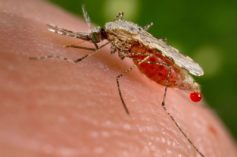STEM and Children’s Books
“No kid wants to read about mosquitoes. Sharks, dinosaurs, even snakes, but not mosquitoes!”
So spoke Barnas Monteith, who works with me to publish science books for kids. Reluctantly, I had to admit he had a point. Mosquitoes may be, as a recent New York Times article reminds us, the greatest killer of human beings throughout our history—our top predator—but in themselves these little insects don’t strike terror in our hearts the way sharks or snakes do. They don’t loom over our imagination the way dinosaurs do.
Maybe mosquitoes don’t scare us because they’re all too familiar. Still, nobody loves mosquitoes. There’s nothing more irritating, more upsetting, more likely to keep a person anxiously awake than the whine of a mosquito somewhere inside the tent.
And mosquitoes carry frightening diseases – dengue, Zika, encephalitis, and above all malaria.
Zika scares us, because an outbreak in Latin America in 2015-2017 led to hundreds of cases of microcephaly. Mothers infected with the Zika virus, especially in Brazil, were bearing babies with small and underdeveloped brains. Luckily, there has been no Zika transmitted in the United States since 2017.
Dengue is transmitted by mosquitoes in 300 countries worldwide. Symptoms include fevers, aching muscles and joints, rash, pain behind the eyes, and sometimes, in severe cases, internal bleeding. Luckily, U.S. mosquitoes don’t yet transmit dengue; the 144 cases diagnosed in the U.S. this year have all shown up in foreign visitors or travelers returning from abroad.
What about encephalitis? That’s harder to sort out, but mosquitoes spread tens to hundreds of cases of viral encephalitis in the U.S. each year. Encephalitis is inflammation of the brain. Symptoms range from headache and fatigue, to fever and light sensitivity, to confusion, convulsions, and rarely even death.
Still, overall, mosquitoes in the U.S. are mostly an annoyance. In parts of Africa, Asia, and South America, they are much more. The reason is malaria, which infects more than 200 million people a year. The Plasmodium parasite, carried by mosquitoes, is developing resistance to many of the medicines developed over the years to kill it. Over 400,000 people a year die from malaria, most of them in sub-Saharan Africa, most of them children.

This image is a work of the Centers for Disease Control and Prevention, part of the United States Department of Health and Human Services, taken or made as part of an employee’s official duties.
Malaria is the reason I wanted to write a science book for children that featured mosquitoes. The trick was to find a story amid the facts.
As I thought about malaria, and especially about my nephews’ experiences with malaria in Kenya, I began to see my heroine Nala, caught between two worlds, between two distant parents, always a bit different from those around her. Part of that difference is her resistance to mosquitoes. In some ways, her resistance is a superpower, and it leads her both into an exploration of her own identity and into adventures and dangers she could not have imagined.
As I began to hear Nala’s voice, I managed to step back from facts and statistics to find my mosquito story. And that’s how MOSQUITOES DON’T BITE ME came to be.
– Written by Pendred E. Noyce








